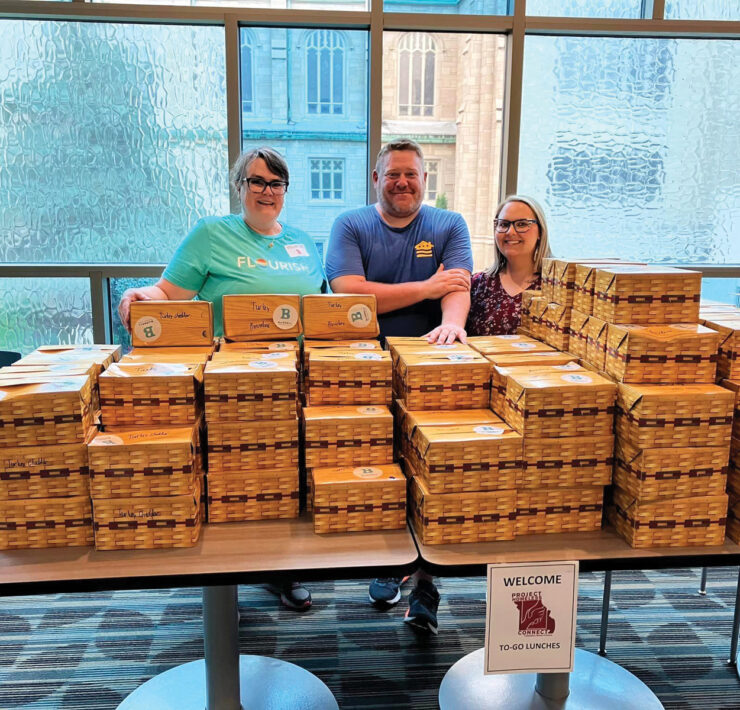From Poverty to Possibility
- "From Poverty to Possibility" originally appeared in the October 2024 "Finance" issue of COMO Magazine.

CMCA’s Financial Opportunity Center offers financial freedom to the community.
Like many cities across the country, Columbia faces challenges with housing insecurity and poverty. As of September 2023, 23 percent of Columbia’s residents (about 27,163 people) were living at or below the poverty line, a number that has steadily increased since 1980. Another 270 or so residents are unhoused.
Thankfully, local nonprofits and social services, such as Central Missouri Community Action (CMCA), are committed to addressing the root causes of poverty and supporting community members in overcoming it.
In the Beginning
CMCA’s origins date to 1964, when President Lyndon Johnson signed the Economic Opportunity Act into law. The act enabled the formation of the Central Missouri Counties Human Development Corporation (later known as CMCA).
Over the years, the organization has instituted a wide variety of programs, from child development programs to energy assistance and housing development, all aimed at achieving its mission of “building relationships to empower people, strengthen resilience, and improve quality of life for all members of the community.”
“Our programs range along a whole continuum,” explained Executive Director Darin Preis, “from fundamental needs, like helping people pay their utility bills and rent, to much more long-term interactions, like Head Start, where we’re working with children and families.”
One program that fits into the latter category is the Financial Opportunity Center (FOC), which assists members in developing a plan to achieve financial stability. CMCA adopted the FOC model about five years ago after insights gained through other family programs.
“We do something called a ‘self-sufficiency matrix,’ where we measure about twenty-two different variables of a family’s health — so income, education level, job stability, access to food,” Preis added. “We were consistently getting information that people really don’t understand their finances.”
Some of the barriers that individuals often struggle with when managing their finances include creating a budget, increasing their credit scores, and opening a bank account.
How the FOC Model Works
The FOC model has three components: income support (connection to benefits, such as SNAP and childcare subsidies); financial counseling; and employment support services (career coaching, job retention, education, etc.). It functions by pairing individuals with coaching services that help them navigate issues such as increasing their income, decreasing expenses, and acquiring assets. The goal is to create sustainable change rather than a temporary solution.
“With our anti-poverty mission, we’ve identified that almost every need that comes through our doors involves finance,” noted FOC coordinator Jamie Wallingford. “Our goal is to see where they’re at right now … and our coaching model helps us break it down and really connect with those individuals.”
Financial issues can quickly become overwhelming for people with low financial literacy. Coaching services start by identifying the individual’s specific needs, such as rental assistance, and connecting them with someone in the community who can help. Coaches then work with the individual to address the root of the problem and set goals such as budgeting, improving credit, managing debt, and income management skills based on the person’s needs.
The FOC is the only program at CMCA that doesn’t require individuals to rely on certain benefits, such as SNAP, to participate. The only stipulation to take advantage of its services is to be at or below 200 percent of the federal poverty level. CMCA won’t turn away individuals above this indicator, however, but rather structure their approach differently.
The Need for Financial Literacy
With 102 active members in the FOC — and constantly climbing numbers, thanks primarily to internal referrals — the need for financial literacy programs proves to be significant throughout the eight counties served.
One way that CMCA can continually provide more to members in different areas is through strategic partnerships with other organizations. Thanks to Heart of Missouri United Way, for example, CMCA is able to address the issue of saving money that families throughout the Boone, Cooper, and Howard counties face.
“Heart of Missouri United Way has supplied us with funding to help members create an emergency savings fund before we start their debt pay-off plan,” Wallingford says. “They’re allowing us to do a dollar-for-dollar match for individuals that are able to save — up to $500.”
That initiative is particularly beneficial for families with nonreducible spending habits, where penny-pinching from necessary spending feels like the only way to save. Independently saving $1,000 might seem daunting for those individuals when many rely on SNAP benefits and housing choice vouchers; however, the assistance can empower them and help them realize that it’s possible to build their savings. It also prevents individuals from falling into predatory lending.
Real People, Real Stories
Over the years, the FOC has seen a number of success stories, each highlighting CMCA’s impactful footprint on the community.
Take single mother, La’Chelle, for instance.
Due to personal circumstances, she worked only eight hours per month. She resorted to payday loans and fell behind on bills and credit card payments. Additionally, she had another baby on the way.
“I met my coach during a time when I didn’t know what I was going to do, trying to figure out how to get out of the dark place I was in,” La’Chelle shared, according to CMCA’s 2023 gratitude report. “I was stressed, overwhelmed, and depressed due to not being able to work and pay my bills.”
Wallingford and the CMCA team helped La’Chelle create a budget and connected her to resources to help her catch up on her bills. After securing proper childcare, La’Chelle picked up more shifts at her PRN job, which allowed her to pay off one of her payday loans. And that accomplishment gave her the momentum she needed to pursue a second job working full-time on the weekends.
Within five months, she had paid off all three of her payday loans — more than $7,000 back.
“She’s now working on obtaining her first home,” Wallingford said, smiling. “She’s truly one of my biggest successes because of her determination and perseverance through this process. She has had setback after setback after setback, but she keeps going because she realized she has the support.”
La’Chelle added, “CMCA has given me unconditional support and constant encouragement that I can do whatever I put my mind to. I want to continue to learn how to continue saving and working on myself.”
Seeking Help
One of the most prominent issues that individuals have when working toward financial freedom is asking for help. Still, stories like La’Chelle’s indicate that it’s possible to overcome financial insecurity with support from organizations like CMCA.
Whether you’re ready to meet with a coach or not, CMCA offers several public resources to help you start on your path toward financial freedom, including its “Financially Fit Podcast,” available on various platforms.
Central Missouri Community Action
Founded: 1964
Mission: To build relationships to empower people, strengthen resilience, and improve quality of life for all members of the community.
Board of Directors:
Jodi McSwain, President
Cotton Walker, Vice President
John Flanders, Treasurer
Ruby Young, Secretary
Elizabeth Anderson
Michelle Barg
Heather Berkemeyer
Khyeese Bethea
Tiffany Burns
Delsa Byrd
Karen Digh-Allen
Stella Druml
Susan Hart
Phillip Iman
Jean Ispa
Dwight Massey
Leslie Meyers
Michael Pryor
Stephanie Schmidt
Paula Sims
Robert Sparks
Janet Thompson
Central Missouri Community Action
800 N. Providence Rd.
573-443-1100
cmca.us




